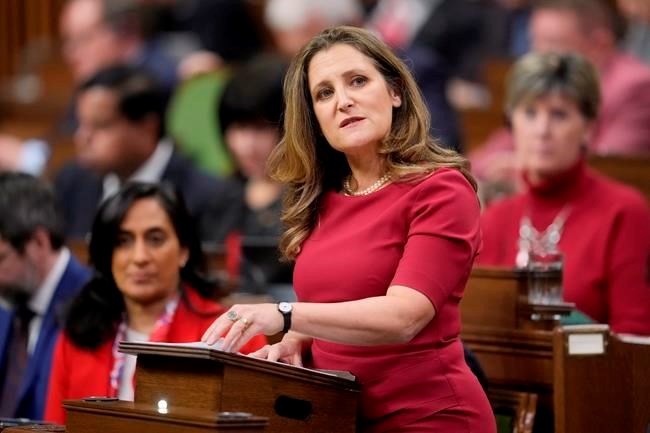OTTAWA — Finance Minister Chrystia Freeland tabled her fall economic statement on Tuesday, updating 91įŁ┤┤s on the country's financial health and introducing some new measures to target the housing crisis.
Here are the highlights.
— $20.8 billion: New federal spending since the spring budget.
— $488.7 billion: Total government spending for the current fiscal year, through the end of March 2024.
— 1.1 per cent: The real rate of GDP growth for 2023. Growth is expected to decline to 0.4 next year, but the government says it doesn't expect the slowdown to result in a recession.
— $40 billion: The updated deficit for this year.
— $38.4 billion: Next year's projected deficit — a $3.4-billion increase from the government's previous projection.
— $15 billion: The amount of money expected to go toward loan funding, beginning in the 2025-2026 fiscal year, to build more than 30,000 homes across Canada.
— $1 billion: The cost of a new affordable housing fund over three years, beginning in 2025-2026, which the federal government projects will help build 7,000 new homes.
— Up to $7 billion: The proportion of a cleantech economic investment fund being allocated for special contracts intended to give companies the confidence they need to make major investments to lower their greenhouse-gas emissions.
— $309 million: Funding for a new co-operative housing development program, which the government says will go toward a co-developed program that it expects to launch in early 2024.
— $35 million: The projected cost of a public inquiry into foreign interference attempts, including $10 million this year, $22 million in 2024-2025 and $3 million in 2025-2026.
— $50 million: Money the government is proposing to spend over three years, starting next year, to support municipalities in cracking down on short-term rentals. The federal government also intends to deny income tax deductions when short-term rental operators are not complying with provincial and municipal rules.
— $129 million: The amount of money over five years that the government expects to spend on an updated 91įŁ┤┤ journalism tax credit, beginning this year. Ottawa proposes to increase the cap on labour expenditures per eligible newsroom employee to $85,000, from $55,000. It is also increasing the amount of salary that can be claimed under the program to 35 per cent, from 25 per cent.
— Mortgage relief: The government says it will update its mortgage charter to ensure that financial institutions offer tailored relief and reasonable payments for borrowers.
— Tax break for co-ops: Co-operative housing corporations that provide long-term rental accommodations will be eligible for the removal of the GST on new rental housing.
— Tax break for therapy: The federal government will exempt GST and HST from psychotherapy and counselling services.
— Tackling junk fees: Ottawa is taking a more detailed look at so-called junk fees. It aims to make sure that airlines seat children under the age of 14 next to their accompanying adults at no extra cost and have the 91įŁ┤┤ Radio-television and Telecommunications Commission launch an investigation into international mobile roaming charges.
— Adoption benefit: The fiscal update says a shareable, 15-week adoption benefit will be available as part of the employment insurance system, starting this year.
— Seasonal workers: The government says up to four additional weeks of regular employment insurance benefits will be available to seasonable workers beginning this year.
— Right to repair: Ottawa is moving to prevent manufacturers from refusing to provide the means of repairs of devices and products.
This report by The 91įŁ┤┤ Press was first published Nov. 21, 2023.
Mickey Djuric, The 91įŁ┤┤ Press



